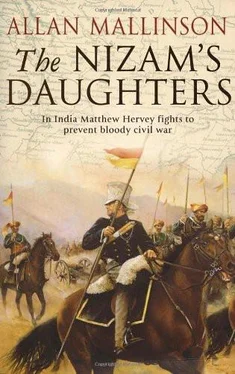Allan Mallinson - Nizams Daughters
Здесь есть возможность читать онлайн «Allan Mallinson - Nizams Daughters» весь текст электронной книги совершенно бесплатно (целиком полную версию без сокращений). В некоторых случаях можно слушать аудио, скачать через торрент в формате fb2 и присутствует краткое содержание. Год выпуска: 2000, ISBN: 2000, Издательство: Bantam, Жанр: Исторические приключения, на английском языке. Описание произведения, (предисловие) а так же отзывы посетителей доступны на портале библиотеки ЛибКат.
- Название:Nizams Daughters
- Автор:
- Издательство:Bantam
- Жанр:
- Год:2000
- ISBN:9780553507140
- Рейтинг книги:5 / 5. Голосов: 1
-
Избранное:Добавить в избранное
- Отзывы:
-
Ваша оценка:
- 100
- 1
- 2
- 3
- 4
- 5
Nizams Daughters: краткое содержание, описание и аннотация
Предлагаем к чтению аннотацию, описание, краткое содержание или предисловие (зависит от того, что написал сам автор книги «Nizams Daughters»). Если вы не нашли необходимую информацию о книге — напишите в комментариях, мы постараемся отыскать её.
Nizams Daughters — читать онлайн бесплатно полную книгу (весь текст) целиком
Ниже представлен текст книги, разбитый по страницам. Система сохранения места последней прочитанной страницы, позволяет с удобством читать онлайн бесплатно книгу «Nizams Daughters», без необходимости каждый раз заново искать на чём Вы остановились. Поставьте закладку, и сможете в любой момент перейти на страницу, на которой закончили чтение.
Интервал:
Закладка:
Captain Hervey smiled sheepishly. ‘Sir, you have aboard a goat and several chickens. And I hear that it is not uncommon to see a cow under the forecastle. To what do you object in equines?’
‘Damn your impudence, sir!’ roared Peto, striking the rail again. But he knew well enough that his protests were to no avail. The frigate Nisus had been placed at the disposal of the Duke of Wellington’s aide-de-camp — and that was that. ‘Mr Belben!’ he shouted.
The first lieutenant rushed aft and saluted. ‘Sir?’
‘Mr Belben, be so good as to find a berth for a cavalry charger,’ said the captain briskly.
‘ Sir? ’ replied the lieutenant, his youthful face contorted by incomprehension.
‘Do I have to repeat myself, Mr Belben?’ rasped Peto. ‘Do you not understand plain English?’ And, as his first lieutenant hurried away to contemplate his unprecedented orders, Peto turned back to this agent of the victor of Waterloo. ‘Come, Captain Hervey,’ he resumed cautiously; ‘I think we may better discuss this extraordinary commission of yours at my table.’
Matthew Hervey was, in outward appearance at least, a man transformed from that of a year ago. Then, he had been a lieutenant for but a month, following the deposit of the better part of his savings, and the prize-money accrued over six years’ campaign service, with the regimental agents. Into the premises of Messrs Greenwood, Cox & Hammersly of Craig’s Court in Westminster he had walked a cornet on his first occasion to visit the capital, and there he had signed an instrument for the purchase of a lieutenancy in the 6th Light Dragoons. He had signed another for the sale of his cornetcy to an officer in the Twentieth anxious to avoid service in India, whither that regiment was posted, and had put his signature to a further instrument for the assignment of arrears of pay, held by the agents, towards the difference in price — £350. Other regiments were cheaper (and a few were markedly more expensive), but Hervey would never consider the option of changing horses. He loved the Sixth as if it were his family — which, in all but the literal sense, it was. Its commanding officer, Lord George Irvine, had always shown him the greatest kindness. Its choleric major, Joseph Edmonds, a soldier who had known almost nothing but campaigning in his thirty years’ service, had encouraged him in every particular of the profession, and had exercised a protecting, paternal hand on many an occasion. Sir Edward Lankester, his troop leader — urbane, coolly, almost contemptuously, brave — had been his idol, like an older brother. His fellow cornets, and lieutenants too, who had filled the mess with laughter and good company in the darkest of times, had been his people as surely as were his blood family in Horningsham. And Hervey would add yet more to that family, for in it he counted, as did any officer worth his salt, the companionship of the ranks — the non-commissioned officers who put his orders into action, and the dragoons, the private men, whose life turned and occasionally depended on those orders, and whose daily routine was either miserable or tolerable depending on the aptness and humanity of the officers. The Sixth, however, were a family that had seen misfortune. Waterloo, though a battle gained, had been, in the duke’s own words, hardly better than a battle lost. True, the Sixth had suffered not half as much as the infantry, but shot, shell and lance had plucked some of the best from its bosom. Hervey may have been in two minds about his new appointment — this mission especially — but before Waterloo he could never have contemplated having a choice at all.
And so now he was Captain Hervey, with aiglets and the patronage of the duke himself, and no longer so impecunious that economy was for him strict necessity. Yet in one respect at least Matthew Hervey was unaltered: to frigate captains he was still in thrall. Captain Peto was, in any case, an officer to whom no ordinary mortal could be other than in thrall. Every reef and hitch, every furl and coil, even in the very extremities of the Nisus , was made in the expectation that his eye might at any time alight on the endeavour. And all was therefore perfection. What was more, however, he achieved this exemplary regimen without resort to flogging. Peto was, indeed, renowned as much for his implacable opposition to the practice as for his boldness in closing with a foe. He had once hanged a man for cowardice in the face of the enemy, but long before the Admiralty had put a stop to it he would not permit a bosun’s mate even to start a laggard.
Captain Laughton Peto was in age two years, possibly three, Hervey’s senior. He was the same height and build, though his back was a little longer, and his hair was dark, full and straight and looked as though it might once have been pulled into a queue. His manner was not easy to fathom — at times the utmost insouciance, and at others zest for the merest detail of his ship’s routine. He might talk discursively one minute, and then in the next his clipped quarterdeck speech would seem almost incomprehensible. Hervey wondered if he were married, for it would go hard with any wife to live with so contrary a man. When they had first met, at Chatham not a week ago, there had been something of an edge to their intercourse. Peto had not been well disposed to the notion of holding his frigate ready for the conveyance of a staff officer, even an aide-de-camp of the Duke of Wellington, and wished only to be about his passage to the Indies before the winds became any less favourable. When Hervey had gone aboard Nisus he had been presented with sealed orders marked, ‘To be opened only at sea’, and so it was off the North Foreland that he had learned that he was to report to the Duke of Wellington with all possible haste, and to request that the ship on no account leave for the Indies without word from Paris — to which Peto had replied, with no little irritation, that he was not in the habit of disobeying Admiralty orders, for those were his instructions too from their lordships. Yet neither man had anticipated that there was to be any congruence in their instructions. So here where the Seine, having flowed peaceably through Bonaparte’s erstwhile capital, became salty by the Channel — for mastery of which Englishmen like Peto had fought since Drake’s day — the captain of the Nisus found himself once more at the disposal of the captain of light dragoons.
Captain Peto’s quarters comprised a day cabin running to half the length of the stern windows, a dining space — the steerage — and two sleeping cabins, one of which, as on the short passage to France, he now gave up to Hervey. The principal cabins were well furnished. Comfortable chairs, as well as a large desk, occupied the day cabin, while a highly polished dining table of Cuban mahogany, and eight chairs, graced the steerage. There were even some pleasant-looking pictures on the bulkheads, including one or two small oils of indeterminate landscapes, and the table was laid with silver.
‘Take a seat, Hervey,’ said Peto, indicating a comfortable armchair; ‘one of my French Hepplewhites.’
Hervey assumed them to be booty, acquired in one of the many dashing engagements he knew Peto to have seen. ‘I presume they are—’
‘I began with ten, but clearing for action takes its toll.’ He said it almost with relish. ‘There are many who consider the Hepplewhite chair in the French taste to be the acme of English cabinetmaking: there is not a single straight line anywhere in it,’ he continued absently, waving an outstretched palm towards one of the objects of his admiration. ‘I bought them in Bond Street when last I was attending at the Admiralty.’
Bond Street? English cabinetmaking? Another fox’s paw he had nearly made of that!
Читать дальшеИнтервал:
Закладка:
Похожие книги на «Nizams Daughters»
Представляем Вашему вниманию похожие книги на «Nizams Daughters» списком для выбора. Мы отобрали схожую по названию и смыслу литературу в надежде предоставить читателям больше вариантов отыскать новые, интересные, ещё непрочитанные произведения.
Обсуждение, отзывы о книге «Nizams Daughters» и просто собственные мнения читателей. Оставьте ваши комментарии, напишите, что Вы думаете о произведении, его смысле или главных героях. Укажите что конкретно понравилось, а что нет, и почему Вы так считаете.











